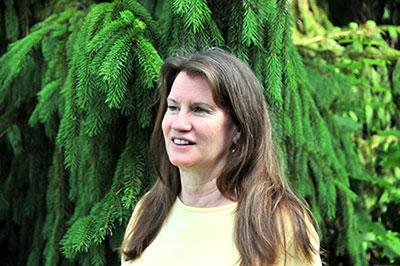
Joyce Hollyday is a co-founder and co-pastor of Circle of Mercy, an ecumenical congregation in Asheville, North Carolina. Her most recent book, Pillar of Fire, is a historical novel that celebrates the extraordinary witness of the medieval mystics known as Beguines. She is the author of other several books, including Clothed with the Sun: Biblical Women, Social Justice, and Us and Then Shall Your Light Rise: Spiritual Formation and Social Witness. She was a founding member of Witness for Peace, a grassroots organization committed to nonviolence and led by faith and conscience. She was formerly the Associate Editor for Sojourners.
Posts By This Author
Living History In Our Midst
As we prepare once more to commemorate the birth of Martin Luther King Jr., and to celebrate Black History Month, I am grateful to have encountered the Delany sisters.
Saints and Goblins
A full moon. A plunge in temperature. Transylvania County, North Carolina. Conditions were just right for Halloween...
From Pentagon to the Pew: The Plague of Sexual Abuse
Urgent change needed in churches around sexual abuse
A Plague in Paradise
Development endangers a way of life on South Carolina's Daufuskie Island
Trials and Triumphs for Feminism
On March 26, former heavyweight boxing champion Mike Tyson was sent to prison to serve a six-year sentence for raping a Miss Black America contestant. Before the verdict, the odds in Las Vegas (where you could place a bet on the trial) were running 5-to-1 in Tyson's favor.
After the judge's decision, people lined up to call Tyson the victim--of either a racist judicial system or a sporting establishment that encouraged his aggressive violence in the ring and looked the other way when it spilled over into streets, parking lots, and hotel rooms. His buddy Donald Trump suggested that if Tyson would just donate some of his millions to a rape crisis center all would be well.
But this time the perpetrator didn't get away with it. Desiree Washington, an 18-year-old college student, went up against Tyson's notoriety, wealth, and handlers--and won. This, despite the predictable efforts of the defense to blame her for her own suffering; despite Tyson's claim in his pleading before his sentencing that he was innocent because "there were no black eyes, no broken ribs." For rape survivors everywhere, Washington's courage brought new hope that justice is sometimes done.
The Tyson trial was only the most recent in a series of controversial skirmishes in the battle of the genders in late 1991 and early 1992. The one that first riveted the nation's attention, of course, was last October's confirmation hearings of Clarence Thomas. Although Anita Hill's charges against Thomas of sexual harassment were not enough to derail the Supreme Court nominee's confirmation, they served to bring the nation to a heightened sensitivity about the issue. According to The Washington Post, formal complaints of sexual harassment against corporate employers jumped substantially in the three months following the hearings, as did requests for sensitivity training and orders for a guidebook on combating sexual harassment in the workplace.
Listen Up, Mr. Bush
10:30 a.m. The knocking at the front door was loud and persistent. A D.C. police officer wanted to know if I had heard anything unusual around dawn that morning.
Nothing unusual. The streets had been noisy the night before—folks out sitting on their stoops until late and playing music loudly in celebration of the warm weather that had just arrived. People were in and out of the crackhouse across the street. But there had been no gunshots, no cries for help that night.
The police officer took me to the porch two doors down—Thelma's porch. The large front window had been knocked out; shattered glass lay everywhere. Thelma came out and explained that somebody had picked up a chair off her porch and threw it through the window. He was being chased by a man with a gun at the time and took refuge in Thelma's living room.
"This is it for me," Thelma said. "I've lived here for 26 years. Raised my kids here. They all graduated from Cardoza and got good jobs." She nodded toward the high school at the end of the block. "But I can't take it anymore."
It wasn't only the violence that was getting to Thelma. Her landlord had raised the rent, she said, to $1,100 a month—an outrageous sum for a small house on which he refused to do repairs. Thelma vowed to be gone as soon as she could figure out where to go. Her grandchildren, who live with her and play hide-and-seek on the long row of our connected porches, will be gone as well.



